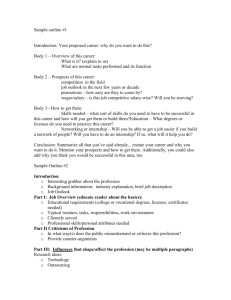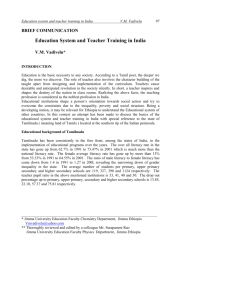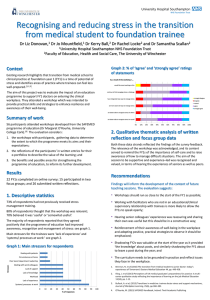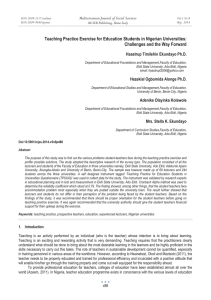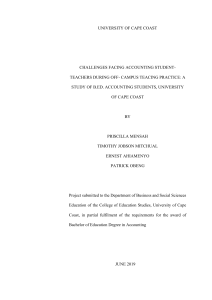Assessment on problems of the new pre
advertisement
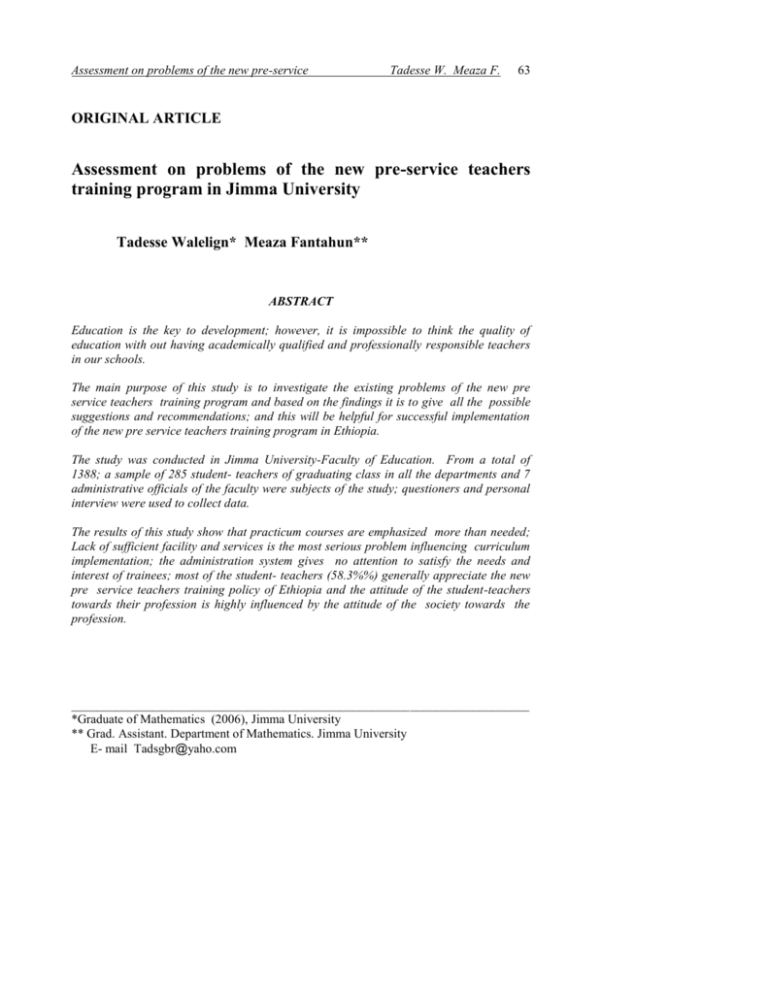
Assessment on problems of the new pre-service Tadesse W. Meaza F. 63 ORIGINAL ARTICLE Assessment on problems of the new pre-service teachers training program in Jimma University Tadesse Walelign* Meaza Fantahun** ABSTRACT Education is the key to development; however, it is impossible to think the quality of education with out having academically qualified and professionally responsible teachers in our schools. The main purpose of this study is to investigate the existing problems of the new pre service teachers training program and based on the findings it is to give all the possible suggestions and recommendations; and this will be helpful for successful implementation of the new pre service teachers training program in Ethiopia. The study was conducted in Jimma University-Faculty of Education. From a total of 1388; a sample of 285 student- teachers of graduating class in all the departments and 7 administrative officials of the faculty were subjects of the study; questioners and personal interview were used to collect data. The results of this study show that practicum courses are emphasized more than needed; Lack of sufficient facility and services is the most serious problem influencing curriculum implementation; the administration system gives no attention to satisfy the needs and interest of trainees; most of the student- teachers (58.3%%) generally appreciate the new pre service teachers training policy of Ethiopia and the attitude of the student-teachers towards their profession is highly influenced by the attitude of the society towards the profession. _________________________________________________________________________ *Graduate of Mathematics (2006), Jimma University ** Grad. Assistant. Department of Mathematics. Jimma University E- mail Tadsgbr@yaho.com Ethiop. J. Educ. & Sc. INTRODUCTION In the efforts of developing the socioeconomic and cultural status of a nation, education is expected to play several key roles. However, it is impossible to think the quality of education with out having academically qualified and professionally responsible teachers in our schools. Thus, for teachers to play their role effectively in schools and to achieve the intended outcomes of educational objectives for societal development, there must be a welldesigned and successfully implemented teachers training program that aims at producing teachers who are academically qualified, professionally skilled, and attitudinally and ethically committed to their profession. Regarding this idea, (Kumar and Ratnalikar, 2005, P 150) suggested the “ of all different factors which influence the quality of education and its contribution to national development, the quality competence and character of teacher are undoubtedly the most significant.” The authors also described those qualities of teachers as follows: “Given an ideal syllabus and sufficient time for teaching but he is not likely to achieve success unless he is enthusiastic about his work, knows the subject and really knows how t teach…, on the other hand a keen and well informed teacher who loves hi subject and believes in its value will succeed in spite of difficulties and handcaps.” Samuel Bekalo and Alasdair Welford research repot of 1997 (EJE, Volume xxi, Number 1, 2001, p 115) shows that practical work hardly ever takes place in Ethiopian secondary science classrooms; and it was not the lack of equipments and resources that always cause the problem but the inappropriate teacher education as a Vol. 2 No. 2 March 2007 64 major problem facing the nation as it sought to implement the intended curriculum. Bekalo and Welford therefore, suggested that teachers do not attempt practical work in schools even when there are conducive classroom settings and reasonable resource. They do not know how too!” The indicates that if classroom learning is to be effective, teachers must be well trained and should be ready to assume their professional responsibilities. In Ethiopia, the first secondary school teacher-training program began in 1952 as a section of the faculty of Arts of Addis Ababa University. In 1995 this section becomes a separate department and it has been a full faculty of education since 1962. (Marew, 2000, p. 15) however previous studies show that secondary teacher education program do not attract academically able and professionally motivated students towards the teaching stream. (Teklehaymanot, 2000, p. 5-6) has to say this “…among the students assigned in social studies teacher preparation program at AAU, only 6.1 and 2. 1 percent made it their first choice in 1998/99and 1999/2000 academic years respectively.” Today in our country, a change in teachers training program is made aiming at developing better teaching skills among the graduates and the new pre-service teachers training program is being practiced in Ethiopian universities Jimma University (JU), as being one of the universities who run pre-service Teacher Education Program, endorsed the need for paradigm shift and has been working for the success of its implementation. However t the best knowledge of the researcher, the problem of the new teachers’ education program is not studied. Thus, the main objectives of this study is therefore to investigate the existing major problems on teachers Assessment on problems of the new pre-service training program; particularly on problems related to curriculum content, curriculum implementation, and trainees attitude towards the training program and towards their profession. Among other things, the findings of this study will help the curriculum designers and/or implementers to be aware of the problem areas and to make all the possible improvement on the training program. It will therefore contribute for successful implementation of the new pre-service teachers training policy in Ethiopia and it will also serve as a springboard for further studies. METHODS OF THE STUDY The study was conducted in Jimma University-Faculty of Education (JUFOE), from February to May-2006. From a total of 1388 student teachers of graduating class student teachers in all the departments of the Faculty, a sample of 285 student teachers and 7 administrative officials of the faculty were subject of study. The reason behind the selection is that since the focus of this study is only on the preservice secondary teachers training program being practiced in JUFOE and student teachers of graduating class are expected to have relatively better experience and exposure to identify the strong and weak sides of the program than first and/ second year student teachers. Tadesse W. Meaza F. 65 In order to get better representation of the entire population, the student teacher of graduating class were divided based on their respective departments and the number of respondents in each department was determined proportionally. The data were collected by distributing selfadministered questionnaire randomly to the student teachers until the required number of respondents is reached. Besides this, interview was made to the administrative officials. The data obtained from closed ended questions were tallied against the options and the value has expressed in numbers and percentiles using tables, pie charts and bar graphs. On the other hand, the respondent opinion and suggestions obtained from open-ended questions and the information obtained from personal interview were analyzed by addressing only the most important and repeated ones. RESULTS AND DISCUSSION 1. Curriculum content related problems In the new pre –service teachers training program practicum courses are integral parts of curriculum that trainees are expected to carryout in different high schools. The table shown below presents perception of the trainees on the emphasis given to the teaching practice. Table -1 Perception of student teachers on the emphasis given to practicum courses (JUFOE, 2006) Responses No. of Respondents Percentage Emphasized more than needed 150 52.6 Sufficiently emphasized 74 26.0 Not sufficiently emphasized 47 16.5 No need to include in the program 14 4.9 Total 285 100 Ethiop. J. Educ. & Sc. Vol. 2 No. 2 March 2007 Moreover, interview results also show that Relevant course have been left out or given less credit hours that do not allow adequate coverage of the content and appropriate attention by the student teachers. Create a negative impact on the time management of the program and on the academic knowledge of trainees. There is sequence problem of the courses. This indicates that as to the respondents practicum courses in the new pre-service teachers training program are emphasized. 2. Problems related to curriculum implementation The most serious problems influencing curriculum implementation the new perservice teachers training program are: lack of sufficient facilities and service which accounts 23.2%, problems related to management and administration system (19.3%;) lack of experienced trainers (15.2%) and others (21.7%). Moreover, interview results show that: Students in the faculty of education are relatively less interested to learn more than passing examinations There is resistance problem among some staff members Instructors over load the learners at the end of the semester, cover one chapter in a single period and others fail to cover relevant chapters of the course. 66 Mostly examinations are always prepared in a way that encourages the student-teachers to rote memorize their lecture notes and handouts than critical thinking on the concept. Instructors are overloaded and some of them are forced to handle courses in which they are not specialized. There is large number of studentteachers with a shortage of relevant reference materials. There is also late administration response. Mostly the withdrawals and complete dismissals are female students. On the other hand, in implementing the Community Based Training Program (CBTP), the respondents recognized the following major problems: The society is not happy to be questioned repeatedly; they understand it as a program involving merely identification of problems without giving solution. Lack of moral and material support for affirmative actins No definite time schedule that affect the time budget of learners and administers. Evaluation is personal. The problems that faced the student – Teachers during the professional practice are summarized bellow. Assessment on problems of the new pre-service Tadesse W. Meaza F. 67 Inadequate supervision 9.70% 25.20% 4.00% In sufficient time for practice Time mismatch with school calendar Lack of financial and material support 29.90% 21.40% 9.80% Theoretical knowledge has no relation with the practical teaching Negative attitude of school community and outside society Fig. 1 Problems of teaching practice in JUFOE in 2006 As one can see from the above pi-chart, the major problems during teaching practice are: Lack of financial and Late registration and class begin materials support (29.9%), inadequate Unable to manage the large number of supervision (25.2%) and insufficient time student teachers lack of coordination and for practice (21.4%). The other problem follow up problem that the respondents reported was that most Give no attention to satisfy the needs of the time the supervisors make bias while and interests of the trainees. “our evaluating student-teachers. faculty provides smaller financial support than others” “they usually With regard to the management and forces us to accept their decision administration process, the student teachers against our interest that led s us to of the faculty point out several problems. dislike the program” The major and the most repeatedly ones are as follow: Ethiop. J. Educ. & Sc. Vol. 2 No. 2 March 2007 68 3. Attitude of student-Teachers towards the training program/policy The following bar graph shows which emphasis approach is more preferable by the student-Teachers. 180 Frequency 200 150 100 82 50 20 0 More emphasis on know ledge of subject matter More emphasis on teaching skills and experience Equal emphasis on both approaches Fig.2 Emphasis approach of teachers-training curriculum preferred by the student teachers of JUFOE92006) The bar graph shown above clearly indicates that the majority of the respondents 180(63.8%) prefers a training curriculum that give equal emphasis on both approaches. They argued that “A teacher can’t address his/her knowledge of subject matter to the students unless he/she uses appropriate teaching methods”. Other 82929.1%) also prefer a more emphasis on knowledge of subject matter. As to the respondents having more knowledge of subject matter is the base to produce technologically competent citizens The remaining 20(7.1%) respondents prefer a more emphasis on teaching skills and experiences since it is what is needed during training. In the new pre-service teachers training policy of Ethiopia, the degree nomenclature is change from B.Sc/BA to B.ED. The next table shows the trainees perception up on it. Table -2 student-teachers perception about the nomenclature B.Ed Response No. of Respondents Percentage Gives me sense 80 28.1% Gives me no sense 165 57.9% Not sure 40 14.0% Total 285 100% Assessment on problems of the new pre-service This indicates the nomenclature B.Ed gives no sense to the majority of the respondents (57.9% and they argued that: It gives no chance to join other related jobs. B.Ed is less respected than B.Sc/B.A among the society. Thus, it gives less professional satisfaction. On the other hand 28.1% of the respondents argued that the B.Ed nomenclature is an appropriate name referring the actual profession of the Tadesse W. Meaza F. individual and prevents loosing their teachers. 69 schools from “It is my identification of the profession; I will be even too glad if the nomenclature is to be named by the subject I am going to teach.” The general attitude of student-teachers of JU to wards the new pre-service teachers training policy of Ethiopia is summarized below. Table -3 General attitude of student-teachers towards the new pre-service teachers training policy of Ethiopia at JUFOE(2006) Response Strongly agree Agree Disagree Strongly disagree Total l No. of Respondents 49 117 66 53 285 Percentage 17.2% 41.1% 23.1% 18.6% 100% This indicates that most of the respondents (41.1%) generally agree on the new preservice teachers training policy of Ethiopia and 18.6% of the respondents strongly disagree on it. mainly on producing a great number of teachers than qualified teachers. As it can be shown from table-3, 41.7% of the respondents do not have positive attitude towards the training policy mainly because of the following reasons: the training program gives no attention to satisfy the needs and interests of the trainees (37.9%), the training curriculum is not well designed (30.2%) and other (26.9%). Moreover, the respondents also point out that the training policy emphasize The information obtained from both the questionnaire and personal interview reveals that the attitude of the society towards a profession is highly dependent on the income it generates to the individual and not on its contribution for societal change and development. 4. Attitude of student-TeachersTowards their profession The following table describes studentteachers’ plan to be teacher when thy were at high school. Ethiop. J. Educ. & Sc. Vol. 2 No. 2 March 2007 70 Table -4 Student-teachers previous plan to be teacher in (JUFOE, 2006) Department Amharic c Biology Chemistry y English Geography History Mathematics Physics Planned Not planned Not sure Total be Afan-Orom Plan to teachers 21 25 2 47 14 16 2 32 7 24 1 32 2 19 1 22 6 16 3 25 8 11 1 20 14 18 4 36 20 28 1 21 1 19 1 21 As the table illustrates, most of the studentteachers (61.8% of the sample) did not plan to be teacher, only 32.6% of the respondents planed to be teacher. Moreover, the attitude of the society significantly affects trainees’ attitude not to be interested in teaching profession. As to the respondents, being teacher will create problems on the individuals. Some of the major and repeatedly forwarded problems are as follow. Lack of social respect Economic problem as the salary is less Misbehavior of students Working in remote areas where there is lack of infrastructures and technological advancements. The result on the extent at which the student teachers love their profession while attending the training program indicates that only 80(31.2%) love their profession very much, 39(13.7% don’t love their profession at all and most of the student teachers 122 (42.8%) in-training love their profession somehow. CONCLUSION AND RECOMMENDATION Conclusion 1. Practicum courses are emphasized more than needed and create a negative impact on other relevant courses. 2. A training curriculum that gives equal emphasis on both knowledge of the subject matter and method of teaching is more preferable by most of the student-teachers. 3. Lack of sufficient facilities is the most serious problem influencing curriculum implementation. 4. Lack of financial and material support, inadequate supervision and insufficient time for practice are the major problems of teaching practice. 5. Most of the student-teachers (58.3%) generally appreciate the new preservice teachers training policy of Ethiopia. 6. Most of the student-teachers did not have planned to be teacher 7. Most of the student-teachers in-training love their profession somehow. 8. Attitude of student-teachers towards their profession is highly affected by the attitude of the society towards the profession. Total Percentage 39 176 16 285 32.6% 61.8% 5.6% 100 Assessment on problems of the new pre-service Tadesse W. Meaza F. RECOMMENDATION In implementing CBTP: In the process of producing academically qualified, professionally skilled and attitudinally committed teachers, the following suggestions among other things will contribute to develop a better curriculum content, to implement the curriculum successfully and to help the trainees to develop positive attitude towards the program and to their profession at large. A. In order to have a well-designed teachers training curriculum: Curriculum contents should be fairly emphasized and appropriately sequenced. . B. In order to implement the curriculum successfully. There should be adequate human, material and financial resources to put the designed curriculum in to practice. Decision making in the process of curriculum implementation should be participatory to avoid resistance problem and to develop the sense of belongingness among the staff members The outlined courses should be adequately covered. The management and administration system should be effective enough to implement the curriculum successfully and to respond the needs and interests of trainees . There should be adequate assessment of trainees’ performance, it should also be continuous and helpful to develop critical thinking and detail understandings among the student teachers. The academic and psychological problem of female student teachers should be given a special attention. 71 To get societal cooperation, the university official together with community leaders should create awareness among the ociety and should solve some of the identified problems. The student-teachers would practice teaching better if they could have full time of practice without having courses and tests back at the university. There must be well-defined criteria to assess the performance of studentteachers during practice and they should be evaluated objectively. C. In order to help the studentteachers develop positive attitude towards the training program; Students should be assigned in teaching stream only if they are interested to be teacher. The management and administration system of the university should give attention to satisfy the needs and interests of trainees. Panel discussions, professional clubs should be included aiming at shaping the behavior and attitude of trainees. Rewards and scholarship opportunities should be provided to those student-teachers who score the highest SGPA. Ethiop. J. Educ. & Sc. D. To make teaching beloved profession among the society and the teachers themselves. Teachers themselves should be respected role models with in the community. There must be program through mass media specially designed to encourage teachers and to change societal attitude towards the profession The government should give special attention in changing the life of teachers by providing a adequate salary, incentives, rewards, promotion opportunities to teachers. The government and the society should create conducive school environments to satisfaction of teachers’ social and psychological needs. Generally, efforts should be made by the MOE to attract academically able and professionally motivated students to wards the teaching stream; the efficiency of the training program should be evaluated and should be frequently revised through the active participation of university instructors. Great attention should also be given to satisfy the social and psychological needs of teachers during and after training so that the intended educational objectives can be achieved. REFERENCE: Aggarwal 9220), Theory and Principle of education, 11tht edition, New Delhi: Best and kahr 92003), Research in Education, New Delhi: Darge 92002), The predominance of different sources of stress among Vol. 2 No. 2 March 2007 72 teachers in government senior high school of Addis Ababa. The Ethiopian Journal education, xxii:1, Addis Ababa. David and Marew 9200), Secondary Teachers Education in Ethiopia, Addis Ababa.. Faculty of Education –JU92004), A study of assessment in high schools for the purpose of implementing practicum, Jimma Farrant (1988), Principles and Practice of Education, Singapore. Getachew (1999), Stress in School Teachers, Ethiopian Journal of Education xix:2, Addis Ababa. Girma, Mehari and Nigatu 91994), The Training and Placement of Vocational secondary School Teachers in Ethiopia, Ethiopian Journal of education xv:2, Addis Ababa. Kumar and Ratnalikar (2005), Teaching of Mathematic, New Delhi Mana and Tesfay (2000), Determinants of Teacher’s Decision to Leave or Stay in the Teaching Profession, Ethiopian Journal of Education xx:1, Addis Ababa Samuel and Alasdar (2001), Secondary Pre-service Teachers education in Ethiopia, Ethiopian Jurnal of education xxi:1, Addis Ababa MOE, (March (2003), Teacher Education system Overhaul document. Wudu and Teffera (2005), Action Research in Education, module II, Jimma.





